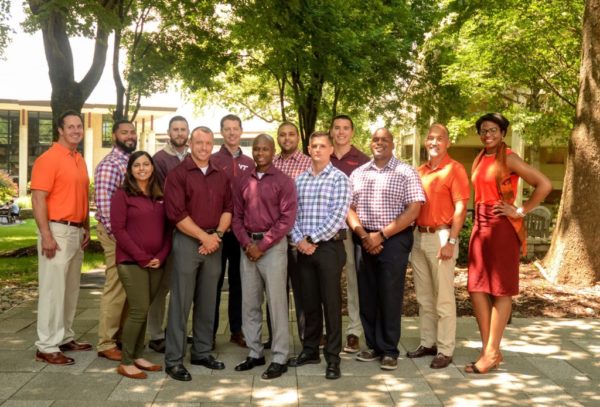The working professionals who pursue the Arlington-based Executive MBA at Virginia Tech get a rich education in the fundamentals of business — accounting and finance, marketing, operations, ethics, communications and leadership.
But woven around those foundation courses are “experiential modules” designed to accelerate development in four essential and current areas:
- Business analytics
- Entrepreneurship & innovation
- Leadership & governance
- Global business
Each module includes two concentration classes plus a “big experience” course that puts the learning to work immediately, says Barbara Hoopes, academic director for Virginia Tech MBA Programs.
Corporate leaders are brought in “to provide guidance and bring real-life projects to students,” adds Parviz Ghandforoush, associate dean for graduate programs in the Pamplin College of Business.
What does this look like on the ground? For the analytics module, which covers BI and data mining along with marketing analytics, Hoopes brought in four software vendors — Microsoft, Qlik, SAS and Tableau — to provide access to their products and act as coaches.
Students addressed pressing issues with U.S. infrastructure using publicly available data to analyze Congressional airport funding and its relationship to economic growth, identify causal factors for large utility outages and predict hazard classifications of dams in order to prioritize inspections.
Hoopes asserts that students really “need to understand how data can be used to support their decision-making.” That means “learning how to tell a story that convinces others” — in other words, traversing that last mile between the data scientist and the people at the very top.
Ghandforoush notes that students often arrive with an expectation that the data work they will do during their MBA is a throw-away “because they don’t need it or they have analysts at work who will do this for them.” And yet faculty hear back from former skeptics that those lessons turned out to be the most valuable in the program “because they’re actually using it at work and they’ve seen the results.”
That’s just what Virginia Tech had in mind when it undertook its redesign of the MBA for working professionals. “It’s not like students graduate and four or five years later we will hear if they have benefited from their MBA,” he concludes. “This is like a laboratory. We get to watch this as it’s happening right before our eyes.”


